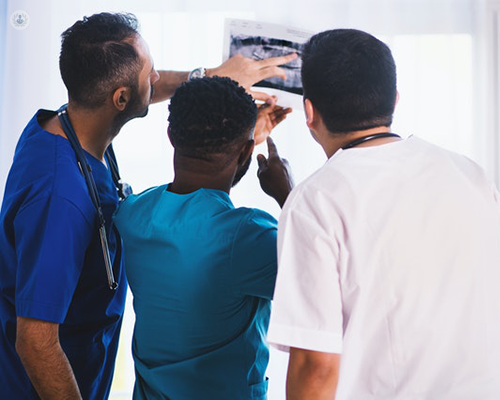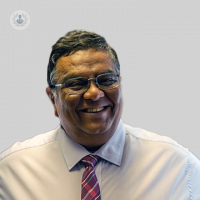Decision making in bowel cancer treatment
Written by:Undergoing lengthy treatment for cancer can be overwhelming, daunting and confusing for patients, particularly when the exact path of the treatment journey is unclear. In this informative article, leading consultant colorectal surgeon Professor Puthucode Haray expertly explains the decision making process for treatment of bowel cancer and how multidisciplinary teams of experts combine their skills and knowledge to maximise successful outcomes for patients.

What exactly is bowel cancer?
Cancerous growths of the large bowel are known as colorectal cancer and are commonly referred to as bowel cancer. These start on the inner lining, called the mucosa of the bowel, often as polyps and can gradually develop into cancers.
What treatment is available for bowel cancer?
The mainstay of treatment for bowel cancer is removing the affected section of the bowel by an operation. Some patients may need some radiation treatment (shining special X-rays onto the tumour) or chemotherapy, which is anti-cancer medication given as tablets or injections before an operation. This is to try and shrink the tumours to make them easier to remove completely by surgery but some patients may need such treatments after the operation.
Most bowel cancer operations can be performed laparoscopically by experienced surgeons. This is keyhole surgery where small cuts are made to allow long narrow instruments to be inserted into the abdomen to perform complex operations. This technique allows early recovery and reduced complications. Some people may need to have a stoma which is when the surgeon needs to bring some of the bowel out on to the surface of the skin and the waste is collected into special bags. When the large bowel is brought out as a stoma it is called a colostomy while a small bowel stoma is called an ileostomy. Some stomas may be reversible.
How are treatment decisions reached?
There are a variety of options in terms of treatment and the following questions have to be considered when opting for the best option for each individual patient:
- Does the patient need an operation or can it be treated by colonoscopy?
- Is there any need to give some treatment before surgery to shrink the tumour?
- Is there any need for treatment after the surgery?
- If so, what kind of treatment is most suitable?
Patients are often concerned about how such decisions are made regarding their treatment options. Even though the patient usually only meets the surgeon, several specialists are involved in choosing the right option to try and provide the best treatment for each patient. This approach uses what is called a multidisciplinary team (MDT). The idea is to try to make the treatment as bespoke as possible for each patient taking into consideration their unique circumstances.
Which specialists are on the multidisciplinary team?
Most MDTs consist of:
- specialist surgeons
- oncologists, who are specialist in dealing with chemotherapy and radiotherapy
- radiologists, who review and discuss the scans
- pathologists, who look at the tissue removed by biopsy or operations under the microscope to determine whether it is cancer and to confirm whether the tumour has gone to the lymph glands or how aggressive it is
- specialist nurses from the bowel surgery department
- endoscopists, who carry out colonoscopy
- specialists in pain management and palliative care
Although the actual membership may vary between centres, these are the core members of an MDT.
How does the MDT communicate decisions regarding a patient's case?
This can vary between hospitals and depending on local arrangements. With my team, we keep the patient and the patient’s general practitioner informed and involved at every stage. Our practice is to review the patient following an MDT discussion to counsel them about the discussion and further treatment plans. These meetings are usually held face to face but because of the pandemic, we are sometimes forced to do this by telephone or virtually. In our practice, the counselling session is always done jointly by a surgeon and a specialist bowel surgery nurse, but this is not common practice in all departments.
Does a patient meet more than one specialist from the MDT?
Usually, the patient has one point of contact. This is most often the surgeon and the specialist bowel nurse. This is to maintain continuity and build a rapport with the patient and their family. However, it is essential that the patient understands that all decisions about their treatment have been reached after an appropriate discussion with the whole team.
Occasionally, in particularly complex cases, more than one specialist from the team may need to see a patient. This is avoided whenever possible, so as not to intimidate or overwhelm the patient and it is left to the surgical team to communicate the decisions of the MDT to the patient. During different stages of the patient’s pathway, the point of primary contact may be changed to the oncologist or other specialist as appropriate.
If you are seeking treatment after a bowel cancer diagnosis, don’t hesitate to visit Professor Haray’s Top Doctors profile to book a consultation.
For more information on bowel cancer care and other related subjects, please visit Professor Haray’s free colorectal education website. In the patient section, you will find a lot of useful information including patient stories with detailed videos to explain every step of the process.


